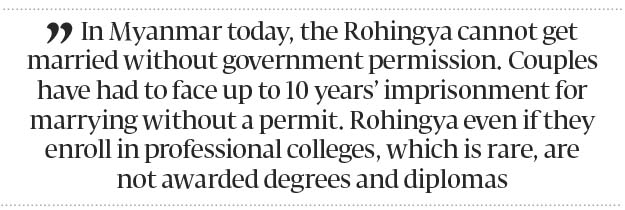Children of a lesser god
Aung San Suu Kyi was absent from the UN General Assembly due to 'pressing needs' at home.

The writer is a barrister of Lincoln’s Inn and attended Berkeley for LLM
Human Rights Watch confirmed the near-total destruction of 214 villages. As international leaders mull over possible responses punctuated with muted rhetoric to this humanitarian crisis, Rohingya Muslims seek solace in merely being alive! The world can do better. We can do better.
Things were not always this bad. Historically, the Rohingya, the Buddhist Rakhine community, and other ethnic groups peacefully coexisted in what is now a Rakhine state, that is, before the politics “trumped” all else. Interestingly, after Myanmar gained independence Rohingya were considered citizens under the Citizenship Act of 1948. Rohingya had the same identification registration cards as other citizens of Myanmar. The war of 1971 between two powerful neighbours, (East) Pakistan and India, was a watershed moment in the Rohingya story. Between 1974 and 1977, more people escaped Bangladesh. In response, the government began the Naga Min (King of Dragons) citizenship verification programme, that aimed to “take measures against foreigners who infiltrated illegally”. Naga Min led to gross human rights abuses, especially against Rohingya. During this period, approximately 200,000 people fled the country.

In 1982, the Ne Win government enacted a new citizenship law. The government designated a list of 135 “National Ethnic Groups” that included only one Muslim group, and excluded Rohingya (citizens until this point). With this law, gradual chipping away of Rohingya status commenced. During a nationwide citizenship scrutiny process in 1989, identification cards were collected from all Rohingya. They were not issued any cards until 1995, when they were issued temporary registration cards that did not confer citizenship. In 2012, Rohingya in northern Rakhine yet again faced state sponsored violence and abuse at the hands of security forces and Rakhine civilians. Loot, sexual abuse and burning of Rohingya villages became a norm leading to internal displacement of 125,000 people. OHCHR documented many abuses and said that they “very likely” amounted to “Crimes Against Humanity”. Late in 2014, as a result of amendment to political parties and voting eligibility laws, Rohingya were entirely disenfranchised and as a result could not get elected nor vote in the 2015 elections that saw “democracy” return to Myanmar with Aung San Suu Kyi as State Counsellor and the military vested with real power.
In Myanmar today, the Rohingya cannot get married without government permission. Couples have had to face up to 10 years’ imprisonment for marrying without a permit. Rohingya even if they enroll in professional colleges, which is rare, are not awarded degrees and diplomas. Rohingya most certainly cannot get jobs. There are limited state-run facilities in the Rakhine state providing health care. Of those that are available, there are reports of Rohingya patients being given expired medication in the state-run hospitals. Malnutrition is also a serious concern for children in IDP camps and in northern Rakhine. Dignity is not divisible. No child deserves to go through what Rohingya children are going through in the state of Rakhine, and now as we see live images, in Cox’s Bazaar.
Even if the historical claim is imprecise does it merit the treatment meted out to Rohingya? Fear cannot justify “ethnic cleansing”. This might still be worse. Crimes appear more horrific than in Rawanda and former Yugoslavia. It may well be a genocide against Rohingya. Yale called it! In International Law, we elevate certain crimes from domestic criminal codes because they shock the conscience of humanity. Regardless of how they choose to define it, the international community must act. And act swiftly. Boycott, Divestment and Sanctions should also be carried out against Myanmar. At the same time, the international institutions such as the Security Council and the Office of the Prosecutor of the International Criminal Court must endeavour to hold those perpetuating the violence accountable under the Rome Statute. A fact-finding mission of the UN Human Rights Council constituted in March to “establish the facts and circumstances of the alleged recent human rights violations by military and security forces, and abuses, in Myanmar…” is simply an inadequate response to on-going Rohingya-purge in the state of Rakhine.
“We, the inventors of tales” Garcia Marquez said in his Noble lecture ”…who will believe anything, feel entitled to believe that it is not yet too late to engage in the creation of the opposite utopia. A new and sweeping utopia of life, where no one will be able to decide for others how they die, where love will prove true and happiness be possible, and where the races condemned to one hundred years of solitude will have, at last and forever, a second opportunity on earth.” We can only wish, even for the children of a lesser god, a second opportunity on earth!
Published in The Express Tribune, September 22nd, 2017.
Like Opinion & Editorial on Facebook, follow @ETOpEd on Twitter to receive all updates on all our daily pieces.















COMMENTS
Comments are moderated and generally will be posted if they are on-topic and not abusive.
For more information, please see our Comments FAQ